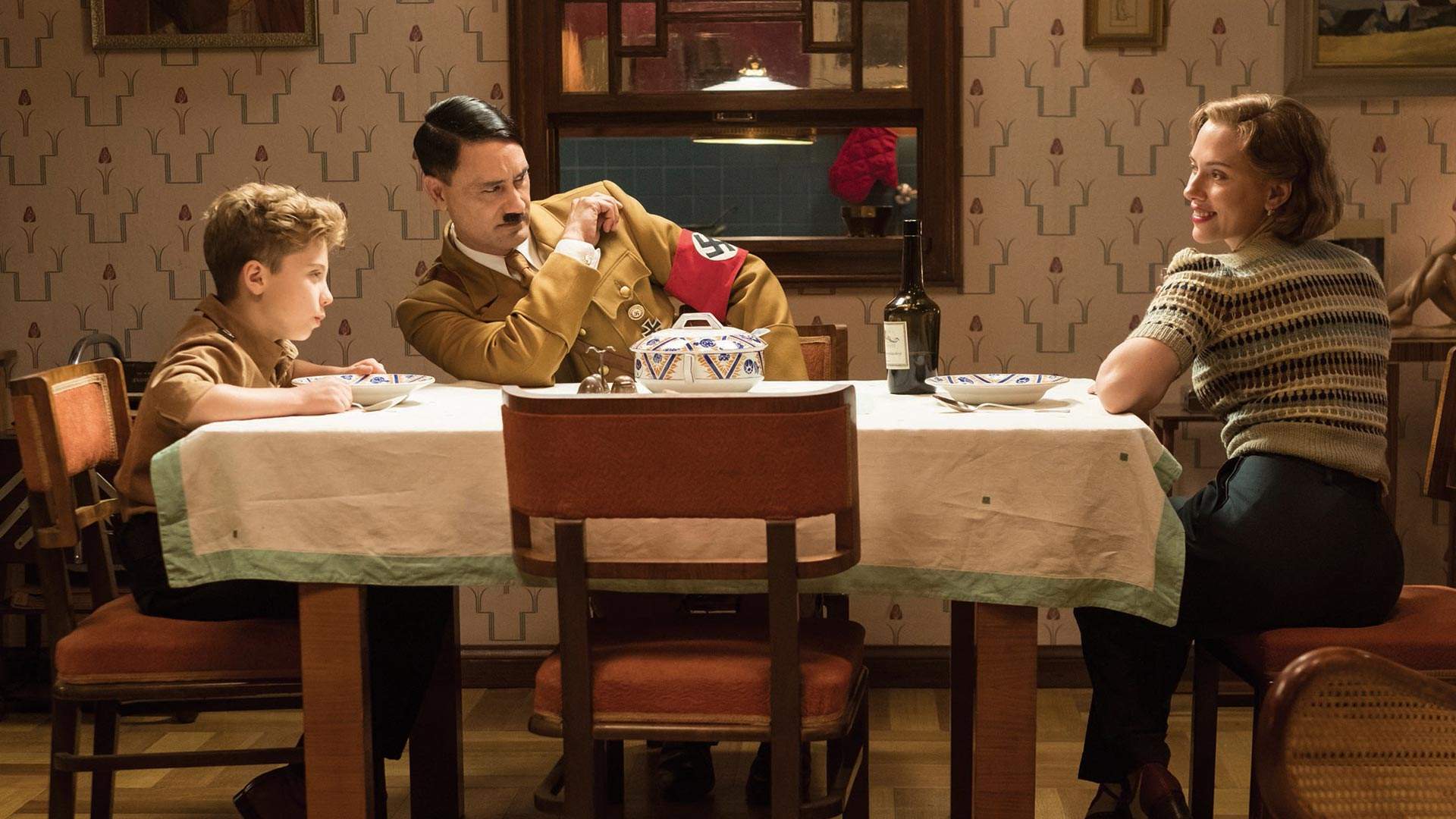Jojo Rabbit
Taika Waititi's “anti-hate satire” has laughs, heart and barbs, but it doesn't completely hit all the right notes.
Overview
UPDATE, March 3, 2021: Jojo Rabbit is available to stream via Disney+, Foxtel Now, Google Play, YouTube Movies, iTunes and Amazon Video.

It's an idea so sharply amusing, so devilishly designed to make a statement and so likely to enrage its target if he were still alive, it's easy to see why Taika Waititi embraced it. In Jojo Rabbit, the New Zealand writer/director/actor — the son of a Maori father, with Russian-Jewish and Irish heritage also in his family — plays an imaginary, egotistical, endlessly preening, thoroughly over-the-top version of Hitler. That's a loaded concept from the get-go. Obviously, Waititi has fun with the task. He serves up a campy caricature of the Third Reich leader, which is exactly what his chosen scenario calls for. But while his self-described "anti-hate satire" has the best of intentions, parodying hatred-driven extremism and championing kindness using Nazi Germany as a backdrop, the purposefully offbeat movie doesn't always find the right tonal balance. It makes fun broadly and proudly to make an important point, and it's firmly a black comedy, but it's not as precise as it needs to be given its subject matter.
Waititi's gleefully exaggerated Führer appears to ten-year-old Jojo Betzler (Roman Griffin Davis) quite often, which the boy is rather pleased about. Not that he had much choice in the matter, but Jojo is a devoted member of the Hitler Youth who is eager to serve his country — and rid it of those he's been indoctrinated to fear and loathe — in the dying days of the Second World War. Alas, at mandatory, feverish training camps, he is just teased by bigger kids. That's where his 'rabbit' nickname springs from, after he refuses to slaughter a bunny to prove his allegiance to the Fatherland. Still, he's devout about his beliefs, despite his kindly mother Rosie's (Scarlett Johansson) gentle push towards more tolerant attitudes. Rosie practises what she preaches, empathising with those resisting the Nazis and hiding Jewish teenager Elsa (Thomasin McKenzie) in the family's attic.
Based on Christine Leunens' book Caging Skies, Jojo Rabbit pinballs its eponymous character between various influences as he comes to terms with Elsa's presence. It's a standard coming-of-age scenario, opening a youth's eyes to the reality of the world as he matures, and bearing witness as he grapples with conflicting notions to forge his own identity — something that Waititi has previously tackled in both Boy and Hunt for the Wilderpeople. Here, of course, Jojo is a child Nazi suddenly nudged to look past his engrained prejudices as a forbidden friendship blooms, although he still interrogates Elsa about grossly inaccurate supposed Jewish traits and tricks first. Around him, Hitler's views on the subject, and on Jojo's new housemate, are as disapproving as you'd expect. The Hitler Youth bullies show Jojo what it's like to be on the receiving end of cruelty, though, even if the group's adult leaders — Sam Rockwell, Rebel Wilson and Game of Thrones' Alfie Allen — aren't exactly strict, stern and seething with hostility.
Splashed across the screen in a bright, breezy manner — and stylistically aping Wes Anderson, particularly Moonrise Kingdom, at times — much of Jojo Rabbit's comedy works in the moment. That's true of Waititi's performance, and also applies to the film's opening juxtaposition: in its first frames, the feature cycles through archival footage of slavish crowds cheering Hitler as The Beatles' 'I Want to Hold Your Hand' plays in German. And yet, though dripping with equal parts sincerity and silliness, Jojo Rabbit doesn't completely add up to the resounding combination of laughs, heart and barbs that Waititi clearly hopes. It boasts all of the above, but there's also a sense of not just cheekiness but clumsiness. While enthusiastically aiming for overstatement, some of the movie's scenes play like thin sketches, too. It also awkwardly and accidentally straddles the line between showing a goofy brand of empathy to everyone in a grim situation and humanising the regime behind some of the 20th century's worst atrocities.
Waititi's irreverent, irrepressible sense of humour is usually a delight (see: his aforementioned films, plus What We Do in the Shadows and Thor Ragnarok), but Jojo Rabbit is at its best when it actually dials back the gags, mockery and pointed current-day parallels, and instead hones in on its central trio in less overt moments. Within such circumstances, first-timer Davis, rising star McKenzie (Leave No Trace, True History of the Kelly Gang) and a tender Johansson all impress. In varying combinations — never all together — they share a parade of thoughtful scenes that leave an imprint, especially when veering into more serious, considered, and even melancholy and dark territory. In an ambitious picture from start to finish, the three actors find the right groove, even if the movie itself doesn't always successfully do the same.





